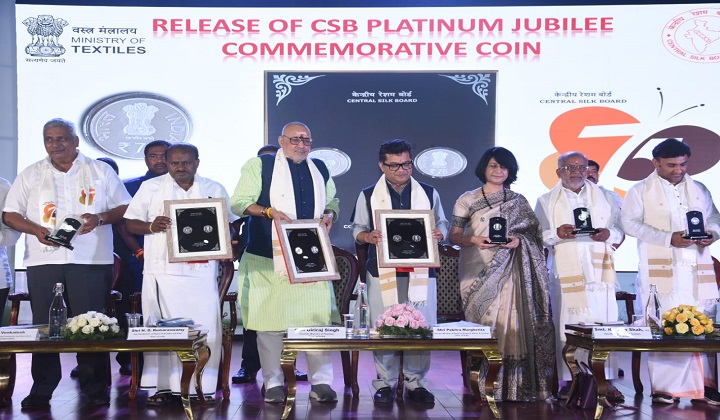On September 20, 2024, the Central Silk Board (CSB) marked a significant milestone with the celebration of its Platinum Jubilee in Mysuru. The event, commemorating 75 years of dedicated service to India’s silk industry, was graced by numerous dignitaries and witnessed several important launches and releases.
Key Attendees
The celebration was attended by a distinguished gathering of government officials and industry leaders:
- Shri Giriraj Singh, Union Minister of Textiles
- Shri H.D. Kumaraswamy, Union Minister of Heavy Industries and Steel
- Shri Pabitra Margherita, Minister of State for External Affairs and Minister of State for Textiles
- Smt. Rachna Shah, Secretary, Ministry of Textiles
- Shri K. Venkatesh, Minister of Animal Husbandry and Sericulture, Government of Karnataka
Several Members of Parliament, including Shri Iranna B Kalladi, Shri Narayana Koragappa, Dr. K. Sudhakar, and Shri A. G. Lakshminarayana Valmiki, were also present, along with other senior officials from the Ministry and Central Silk Board.
Commemorative Releases and Launches
The event featured a series of significant releases and launches, highlighting the CSB’s achievements and future initiatives:
1. Documentary and Commemorative Items
- A documentary video showcasing CSB’s 75-year journey
- Commemorative coin unveiled by Shri Giriraj Singh
- Coffee Table Book titled “CSB in the Service of the Nation Since 1949”
- Postal cover featuring the CSB 75 Years Logo
2. New Mulberry Varieties and Silkworm Hybrids
- CBC-01 (C-2038) for Eastern and Northeastern India
- CMB-01 (S8 x CSR16) and CMB-02 (TT21 x TT56)
These new varieties aim to enhance silk production and diversify production areas.
3. Innovative Technologies
Four new technologies were introduced:
- Nirmool
- Seri-win
- Mr. Pro
- A trapping machine
These innovations address critical challenges in pest management and promote sustainable practices.
4. Educational Resources
- Release of 13 books, 3 manuals, and 1 Hindi magazine focused on sericulture
5. Digital Initiative
- Official launch of the Silk Mark India (SMOI) website
6. Collaborative Partnerships
Memoranda of Understanding (MoUs) were exchanged with prominent institutions:
- ICAR-CIFRI Barrackpore
- Jain University Bengaluru
- Assam Agricultural University (AAU), Jorhat
These partnerships aim to strengthen cooperative efforts in sericulture research and training.
Seri-stakeholders Experience-Sharing Session
A two-day session brought together stakeholders from the silk sector and by-product producers. Key suggestions from the discussions included:
- Creating a platform for utilizing sericulture waste in various applications
- Strengthening market facilities in sericulture states
- Stabilizing cocoon prices and reducing middlemen influence
- Providing subsidies on sericulture components
- Adjusting unit costs in line with market inflation
Historical Context and Achievements
Establishment of the Central Silk Board
- Set up on April 9, 1949, based on recommendations from the Silk Panel
- Established under the CSB Act 1948, enacted on September 20, 1948
CSB’s Role and Responsibilities
- Sole organization for comprehensive sericulture Research & Development
- Coordinates development programs across 26 States/UTs
- Maintains a four-tier silkworm seed production network
- Leads in commercial silkworm seed production
- Standardizes quality parameters in production processes
- Advises the government on sericulture and silk industry matters
R&D Achievements
- Development of over 51 silkworm hybrids
- Creation of 20 high-yielding varieties of host plants
- More than 68 patented technologies
- Indigenous production of Automatic Reeling Machines
Industry Growth and Global Position
- India now ranks as the second-largest silk producer worldwide
- Global production share increased from 6% (1949) to 42% (2023)
- Raw silk production grew from 1,242 metric tonnes (1949) to 38,913 metric tonnes (2023-24)
- Efficiency improvements: Renditta decreased from 17 to 6.47
- Productivity per hectare of mulberry plantations increased from 15 kg to 110 kg
- Silk exports earnings rose from ₹0.41 crores (1949-50) to ₹2,028 crores (2023-24)
- Indian silk now exported to over 80 countries




 Ashwini Vaishnaw Launches Rail Tech Poli...
Ashwini Vaishnaw Launches Rail Tech Poli...
 President Murmu Flies ‘Prachand’ in Hist...
President Murmu Flies ‘Prachand’ in Hist...
 Indian Railways & Indian Army Open M...
Indian Railways & Indian Army Open M...








